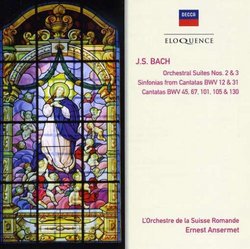Elegant Bach from Ansermet
Johannes Climacus | Beverly, Massachusetts | 01/13/2009
(5 out of 5 stars)
"Ernest Ansermet had a penchant for cool, intellectualized readings of classical repertoire, and that disposition is well suited to the music of Bach. The great Swiss conductor regularly performed the Orchestral Suites in concert with the SRO and as a guest conductor elsewhere (I heard him with the BSO in an exquisitely crafted rendition of No. 2 sometime in the early '60's), and he evidently had a more than passing interest in Bach's sacred music as well. The excellent liner notes point to Ansermet's early career in mathematics as a springboard for his interest in this most intellectually satisfying of composers. In this modestly-priced double album you will find elegant, if somewhat reserved, renditions of Suites 2 and 3; Cantatas 45, 67, 105, 130 as well as three excerpts from 101 (hardly the obvious choices for a non-specialist conductor); and the Sinfonias from BWV 12 & 31.
The two Suites are expertly played (André Pepin a scintillating, if at times inflexible flautist in #2 and there is some fine trumpet work in #3), with appropriately light textures and sensitivity to the stylized dance idioms. The Suisse Romande ensemble is of an appropriate size, even though their phrasing and rhythmic articulation will seem old-fashioned to listeners used to period performance practice. Though these are by no means the most fetching renditions of these works from the "pre-authentic" era (Monteux is more winsome in #2 and Klemperer's mono recordings of all four are outstanding), I still enjoyed Ansermet's elegant, linear treatment of them. The same goes for the two Cantata Sinfonias--pleasing in their well-regulated way, but a little short on joie de vivre in BWV 31 and on pathos in BWV 12.
The Cantatas fare much better; in fact, I have always regarded these as among the finest Bach Cantata recordings of the early stereo era. Ansermet has a fine choir at his disposal; their bright, transparent tone, clean diction and nimble articulation are particularly welcome in the densely contrapuntal opening choruses of BWV 45, 101 and 105. They soar aloft splendidly to join forces with the angelic host in BWV 130. The soloists--Ameling, Watts, Krenn, Partridge and Krause, all in their youthful prime--are also very impressive, particularly Partridge (haunting in the extraordinary harmonic twists of the c-sharp minor aria in BWV 45, scintillating in his jolly aria with horn obbligato in BWV 105) and Krause (a commanding presence in the Bass arioso from the same cantata as well as the apocalyptic evocation of the diabolical dragon in BWV 130). Ameling and Watts will melt your heart in their sublime duet from BWV 101 (too bad Ansermet didn't see fit to give us a complete rendition of this harrowing work). In her demanding aria from BWV 105, Ameling gives a poised, appropriately searching account of the tormented conscience. This is simply the finest interpretation of "Wie zittern und wanken" I have heard. Krenn is nuanced and elegant in his festive aria from BWV 67. Perhaps Ansermet could have made more of the dramatic contrasts in the remarkable scene depicting Christ stilling the tempest from the same cantata; and I could do without the long locomotive-coming-to-a-stop rallentandi that disfigure the concluding measures of the fugal choruses in BWV 45 and 105; otherwise, one cannot fault him on points of interpretation. He undoubtedly has a deep affinity for this music; yet he avoids wearing his enthusiasm on his sleeve. These are clear-headed, objective readings that impress the listener more with each hearing (I have been enjoying them on LP for at least 40 years!).
Of course, veteran Bach enthusiasts will have preferred versions of all these works: mine would be Karl Richter in BWV 45, Suzuki in 67, Werner in 130, Harnoncourt in 101 (one of the greatest Bach cantata recordings ever) and Lehmann in 105 (a venerable relic of the monaural era, long out of print). But you are well advised to give Ansermet a hearing; you will be pleasantly surprised.
The digital transfer has been well handled. The sound, which was always first-rate on LP, emerges with greater focus and ambient warmth, particularly in the cantatas. The orchestral music, recorded earlier, sounds somewhat two-dimensional to my ears, with drier string timbre than on LP.
Recommended enthusiastically for the cantatas; with minor reservations for the orchestral works."

